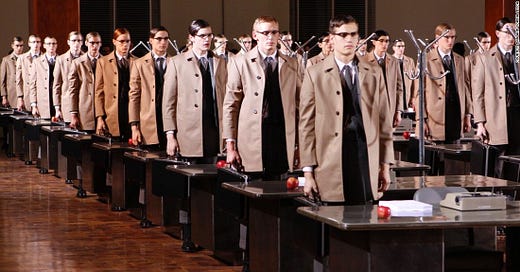The Subversive Art of Thinking
Questioning should not merely be tolerated; it should be embraced as the bedrock of a thinking society. To ask “why?” and “how?” and “who benefits?” is not a form of treason—it is a citizen’s duty.
The last few decades have witnessed an unsettling phenomenon: those who dare to think critically, to question official narratives, to peer beyond the shimmering curtain of consensus reality, are often met with suspicion, disdain, or outright dismissal. The label “conspiracy theorist,” once a fringe insult, has metastasized into a universal cudgel, wielded with ruthless efficiency to silence dissent and marginalize inquiry. These days, to question is to sin, to probe is to invite ridicule, to stray from the prescribed script is to risk excommunication from the Church of Accepted Wisdom.
This modern modus operandi, a kind of social autopilot for the intellectually incurious, has its roots in the deep fissures of 20th-century history. It was in the aftermath of the Kennedy assassination, with its lone gunman narrative constructed as if by magicians more than historians, that the machinery of dismissal was first fine-tuned.
But as we moved into the new century, the stakes and scale of unquestioning obedience expanded exponentially. The war on terrorism, a global theater of smoke and mirrors, conditioned entire populations to trust without scrutiny. The refrain was simple: To question is to aid the enemy. The script recycled itself with the advent of global pandemics and localized epidemics, where even the mildest skepticism about origins or policy responses earned immediate condemnation. The same pattern repeated with every mysterious plane disappearance, every new war, every dubious claim from faceless experts whose edicts shaped, constrained, and rewrote lives.
Yet questioning should not merely be tolerated; it should be embraced as the bedrock of a thinking society. To ask “why?” and “how?” and “who benefits?” is not a form of treason; it is a citizen’s duty. The erosion of this fundamental principle traces its origins not only to political convenience but also to a broader, darker trend: the systematic degradation of education.
Across America—and indeed, throughout much of the so-called developed world—schools have ceased to cultivate critical thought. The ancient tools of freedom—history, literature, logic, and rhetoric—have been discarded in favor of a bland, prepackaged curriculum of obedience. Students are no longer taught to evaluate ideas on their merit; they are taught to memorize the ideas of others. The goal is no longer wisdom but conformity, no longer understanding but compliance.
The result is a populace ill-equipped to grapple with the complexities of the modern world. Too many people are blank slates onto which the trending ideologies of the day are scrawled with neon markers. They march, zombie-like, in lockstep with the latest causes, virtue-signaling their righteousness by posting black squares on Instagram, flying Ukrainian flags without understanding the conflict’s history, and adopting the slogans of the hour without the faintest whisper of critical thought.
This is not freedom. This is not progress. This is a kind of mass hypnosis, an Orwellian nightmare in which cognitive dissonance is not merely tolerated but celebrated. In 1984, George Orwell warned us of the dangers of doublethink, the capacity to hold contradictory beliefs simultaneously. In Brave New World, Aldous Huxley foresaw a society seduced into docility by the pleasures of immediate gratification. We are now living in the grim convergence of these two dystopias, a world in which the pleasure of unthinking compliance is matched only by the terror of stepping out of line.
But all is not lost. If we are to reclaim our humanity, our freedom, our very souls, we must return to the ancient paths. We must reintroduce into our schools and our lives the disciplines that teach us to think, to question, to know. History must be more than dates and names; it must be the story of humanity’s struggles and triumphs, a mirror for our own times. Literature must be more than entertainment; it must be the lens through which we examine the human condition. Logic and rhetoric must return as the twin pillars of a free society, equipping citizens not only to discern truth but to defend it.
For in the end, knowledge—true, authentic knowledge of reality—is the only path to freedom. It is not enough to be free in body; we must be free in mind. And that freedom begins with the courage to ask questions, even in the face of ridicule, even when the world seems bent on silencing dissent. To think is to resist. To resist is to live.
Michael S. Rose, a leader in the classical education movement, is author of The Art of Being Human (Angelico) and other books. His articles have appeared in dozens of publications including The Wall Street Journal, Epoch Times, New York Newsday, National Review, and The Dallas Morning News.






By the way, I purchased your book and look forward to reading it soon. Richard
Yes, I agree. One of the strategies that I always worked with my readers was questioning to understand— being great questioners and inquisitive about everything. One of the first things we learned in undergraduate college at Miami, was Bloom’s levels of thinking. Sadly, the statistics showed that most teachers only worked at the first three lower levels of thinking. To grow life- long critical learners, it is essential that we become more metacognitive about our teaching and thinking and intentionally work at more higher level thinking .
Thank you for sharing this thinking post, as it is our duty to ask questions and not allow censorship.